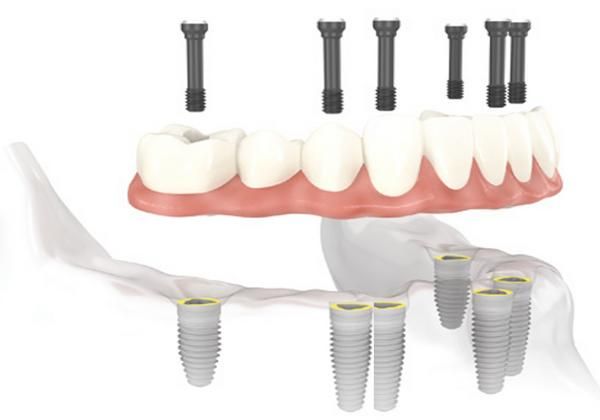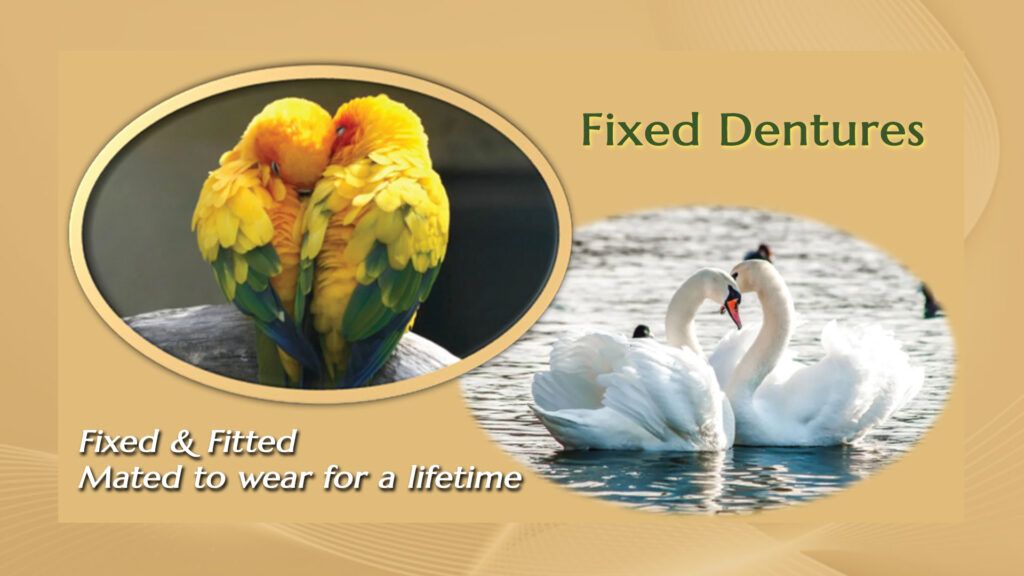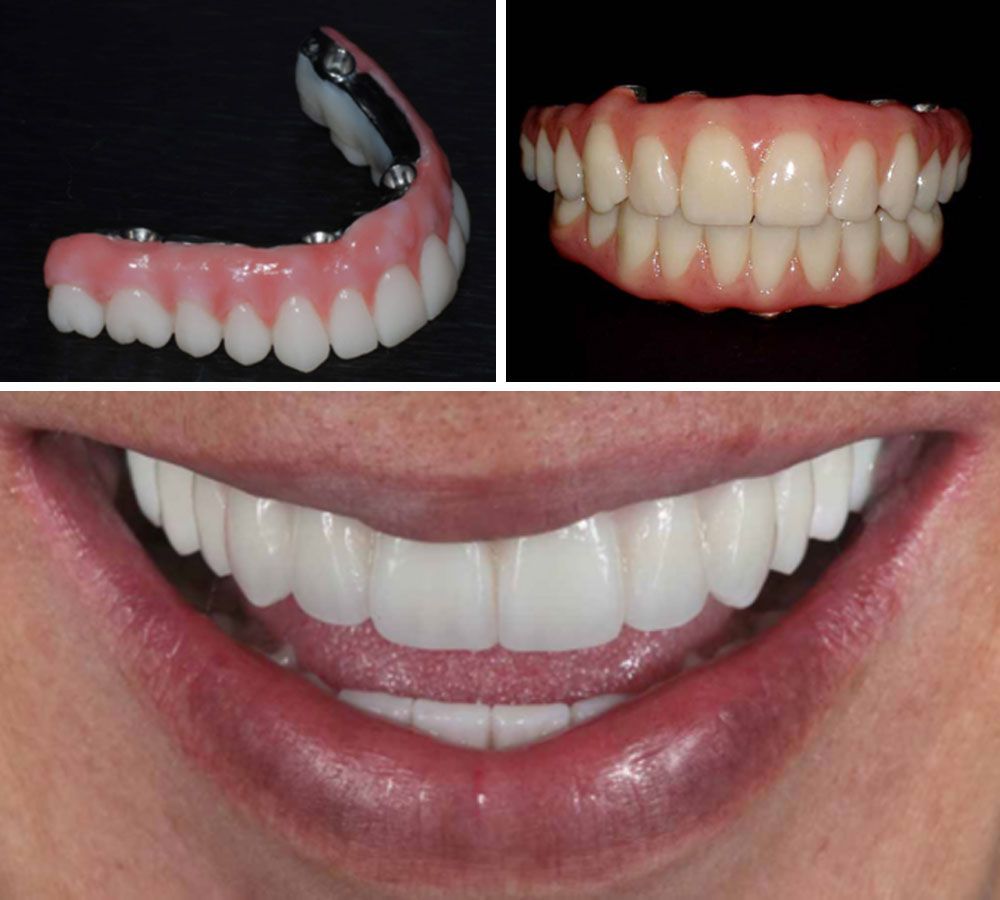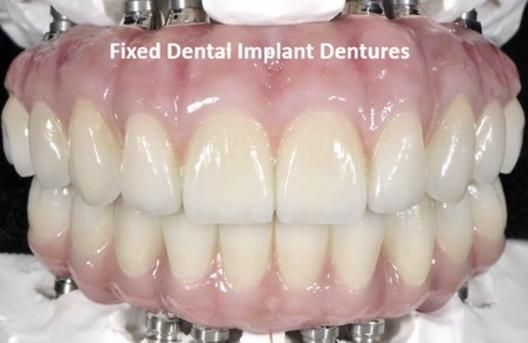
Fixed Dental Implant Dentures and Appliances
Advantages of fixed implant prostheses
A Fixed Dental Implant Denture offers benefits from both a functional and esthetic point of view and may be regarded as quite similar to a patient’s own natural dentition when compared to alternative treatment options such as traditional dentures or even Snap On Implant Dentures. There is a significantly reduced bulk to a Fixed Dental Implant Denture which is perceived to be more comfortable and since no tissue support is needed, patients can chew with greater force and eat a wider range of foods.
Fixed Dental Implant Dentures lead to a gain of mandibular bone because of the adaptation to higher chewing forces whereas Snap On Dental Implant overdentures can still lead to bone loss in the back regions. Patients report enhanced social confidence as a result and reported quality of life satisfaction scores are highest with a Fixed Dental Implant Denture.
With all Fixed Dental Implant Dentures, the contour should be carefully shaped in order to allow for oral hygiene access as these appliances cannot be removed by the patient for cleaning. When a Fixed Dental Implant Denture appliance is close to the oral tissues, the Fixed Dental Implant Denture undersurface should be smooth and highly polished.
Metal-acrylic resin Fixed Dental Implant Dentures
This Fixed Dental Implant Denture type shows excellent clinical long-term results and until recently it has been the primary type of Fixed Dental Implant Denture appliance provided to patients. A metal framework is fabricated which attaches to the implants and which has been designed to incorporate mechanical elements to help retain acrylic resin and artificial denture teeth. The current technology also uses CAD/CAM to fabricate precision-fit frameworks. The final Fixed Dental Implant Denture is usually screw-retained and is relatively easy to retrieve if denture teeth or acrylic resin need to be repaired.

Key Points
- Fixed Dental Implant Dentures offer high predictability and patient satisfaction
- Fixed Dental Implant Dentures are reported to offer higher patient satisfaction and quality of life when compared to other treatment options
- The distance available between the front and back dental implant placement determines an implant denture’s length and chewing coverage
- Screw-retained Fixed Dental Implant Denture designs offer biological and maintenance advantages in comparison to cement-retained solutions
Metal-ceramic Fixed Dental Implant Denture
The hybrid Fixed Dental Implant Dentures simulate a typical ceramic-metal bridge made for natural teeth in the sense that a substructure is fabricated to provide both the attachment to underlying implants as well as an ideal porcelain thickness for long term durability. A full-contour wax-up of the framework is done and the thickness is determined and scanned. The scanned image of the metal framework is employed in a digital CAD-CAM process to create a metal framework from a ceramic compatible metal. The ceramic material is then added to the metal framework to create gums and teeth.
A metal-ceramic Fixed Dental Implant Denture shows very good esthetics, as ceramic is more life-like than acrylic resin. It is important to consider prescribing an occlusal guard for adjunctive protection of the applied dental materials since it is possible to fracture the ceramic.

All-Ceramic Fixed Dental Implant Denture
This type of Fixed Dental Implant Denture is conceptually similar to the metal-ceramic fixed appliance, except the substructure is made from ceramic (zirconia) instead of metal. Ceramic is then applied to the zirconia framework directly.
Patients who request a metal-free Fixed Dental Implant Denture and/or demand an excellent esthetic outcome may be better managed with an all-ceramic Fixed Dental Implant Denture in which the gray color of metal-ceramic does not need to be masked. Here too, an all ceramic Fixed Dental Implant Denture shows the best esthetics, as all ceramic is more life-like than acrylic resin and metal-ceramic hybrid dental implant dentures.
It is important to consider prescribing an occlusal guard for adjunctive protection of the applied dental materials since it is possible to also fracture the ceramic in this appliance design.

You deserve high predictability and satisfaction
Both types of Fixed Dental Implant Denture retention, screw-retained and cemented, can give excellent long-term results, although the retrievability afforded by screw-retained prostheses clearly offers the safer and most versatile option. Nonetheless some dentists prefer the cementation protocol since this approach precludes visibility of access openings in the tops of the artificial teeth for screw access.
For full-arch Fixed Dental Implant Denture appliances, a screw-retained design is recommended as any maintenance procedure or subsequent treatment can be performed more efficiently by removing the Fixed Dental Implant Dentures.
